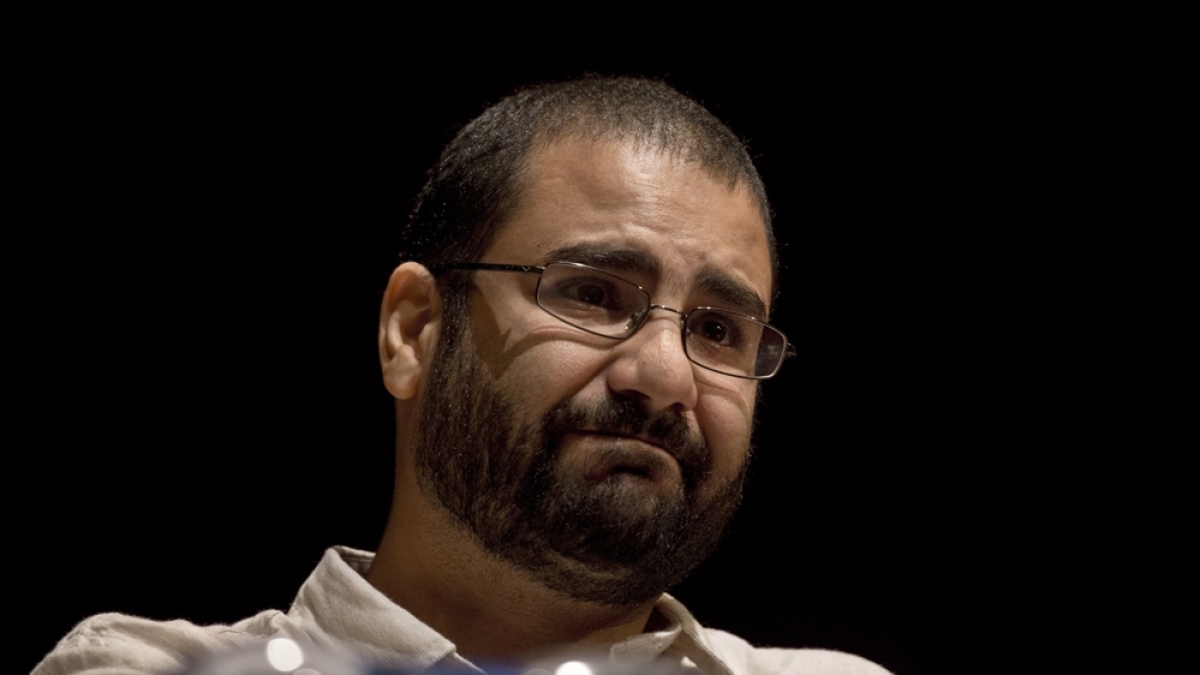Prominent jailed Egyptian activist Alaa Abd el-Fattah has begun a full hunger strike ahead of the COP27 climate summit, as supporters say he will be either dead or free when world leaders convene in Sharm el-Sheikh next week.
Abd el-Fattah said in a letter to his family that he would start a zero-calories hunger strike on Tuesday and stop drinking water from November 6, when global climate talks are set to kick off in the Red Sea town.
“I have decided to escalate, at the appropriate time, my struggle for my freedom and the freedom of all prisoners,” he wrote.
His sister Mona Seif said in a video statement posted on social media that the decision was irreversible.
“He decided that if they’re determined to keep him in prison forever, or until he dies, then at least he will decide the terms of the battle and lead the charge,” she said. “I can’t ask him to stop what he’s doing.”
Abd el-Fattah, an outspoken dissident and a citizen of the United Kingdom, rose to prominence with the 2011 pro-democracy uprisings that swept the Middle East and in Egypt toppled long-time President Hosni Mubarak.
He was first sentenced in 2014 after being convicted of taking part in an unauthorised protest and allegedly assaulting a police officer. He was released in 2019 after serving a five-year term but was rearrested later that year in a crackdown that followed rare anti-government protests.
In December 2021, he was sentenced to another five-year term on charges of spreading false news. He also faces separate charges of misusing social media and joining a “terrorist” group – a reference to the banned Muslim Brotherhood, which authorities declared a “terrorist organisation” in 2013.
For months, the influential 40-year-old blogger had been on a partial hunger strike, consuming only 100 calories a day and prompting concerns for his health.
The family, which communicates with Abd el-Fattah through weekly letters and during rare visits, says it fears that if he is not released during the climate conference, he will die without water.
The family’s next visit is scheduled for November 17.
Abd el-Fattah’s sister Sanaa Seif on Tuesday staged a sit-in at the headquarters of Britain’s foreign ministry to push the UK to take action in his case.
In April, the family announced he had obtained British citizenship through his mother, Laila Soueif, as a way out of his “impossible ordeal”.
On Twitter, Seif said her brother was not “bluffing”. “He’s fuelled by hope to be reunited with us & rage at the 9 years stolen from his life,” she said.
Alaa just drank his last cup of tea in prison. Starting today he’s on zero calorie strike.
In 5 days, as #COP27 starts, he will cease consuming water as well.
Alaa is not bluffing, he’s fueled by hope to be reunited with us & rage at the 9 years stolen from his life. #FreeAlaa pic.twitter.com/5j1f5r2nil— Sanaa (@sana2) November 1, 2022
Egypt’s human rights record has come under increasing scrutiny ahead of the global climate conference and Abd el-Fattah’s plight has been highlighted by prominent activists including Canadian author Naomi Klein.
“Alaa will either be free in the next days or he will die in prison during #COP27 as the world watches,” Klein wrote on Twitter. “His family + friends have done everything possible to work for his release.”
This is shattering news. Alaa will either be free in the next days or he will die in prison during #COP27 as the world watches. His family + friends have done everything possible to work for his release. He is a hero in jail for sharing a Facebook post about torture. #FreeAlaa https://t.co/08yaJ25tIa
— Naomi Klein (@NaomiAKlein) October 31, 2022
The hashtag #FreeAlaa has become a rallying cry against a government that has been relentlessly silencing dissenters and clamping down on independent organisations for years with arrests and restrictions.
Human Rights Watch in September said in a report that the Egyptian government had severely curtailed environmental groups’ ability to carry out independent policy, advocacy, and field work essential to protecting the country’s natural environment.
These restrictions violated the rights to freedom of assembly and association and threatened Egypt’s ability to uphold its environmental and climate action commitments, it said.
Abd el-Fattah hails from a family of political activists, lawyers and writers. His late father was one of Egypt’s most tireless rights lawyers. His sisters – also British citizens – are also political activists, and his aunt is the award-winning novelist Ahdaf Soueif.
